Erica Verrillo's Blog, page 110
October 15, 2012
Publishing: Editors and why we love/hate them
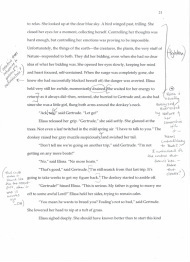 A page from World's End There are all kinds of editors, good ones, bad ones, and many in between. A good editor is one who will give you a run for your money. She will not only correct all your grammar errors, but will question you on every detail, find logical inconsistencies, hold your feet to the fire. Odds are, she will write, “Show, don't tell!” somewhere on your manuscript.
A page from World's End There are all kinds of editors, good ones, bad ones, and many in between. A good editor is one who will give you a run for your money. She will not only correct all your grammar errors, but will question you on every detail, find logical inconsistencies, hold your feet to the fire. Odds are, she will write, “Show, don't tell!” somewhere on your manuscript.A bad editor will not do anything at all. Increasingly, editors – who are generally underpaid and overworked – simply don't want to put any time or effort into a manuscript. Like a home owner who doesn't want to fix up a house before putting it on the market, they want to publish a book “as is.” Writers who have dealt with editors who are real sticklers may think this is sheer heaven. After all, editors who do nothing are great for an author's ego. But, believe it or not, there are errors in your manuscript – of internal logic, of grammar, and of sense. There always are. Trust me, you don't want your readers (or reviewers) to point out your mistakes.
Good editors are a dying breed, but great editors – ah, these are the ghosts of the past. A great editor not only gives his authors a run for their money, he brings out the best in them. A great editor puts his own ego aside (a rarity), and instead of adhering to a rule book (“Show, don't tell,” “Only one POV allowed”), follows the author's lead. Great authors break the rules, and great editors let them. A quick look at the rejection posts on this blog will give you an idea of what great authors have in common – and why editors/publishers (who were not up to their jobs) rejected them.
I had a good editor at RH. She forced me to examine everything in my manuscript – every chapter, every paragraph, every sentence, every word, every punctuation mark. I fought her every step of the way - and sometimes I was right. When I caved in to her insistence on following the rule book it robbed something from my story. But, more often than not, she was right. The trick to working with her was to understand what she was getting at, and then adjust my manuscript – slightly. In editing my first book - and this will always haunt me - I deleted too much. This is a common mistake for first-time authors. They throw the baby out with the bathwater.
I have learned through trial and error that the best way to work with editors is to walk the middle path. When they say “Jump,” don't ask “How high?” In other words, don't slavishly follow every suggestion. Use your judgment. On the other hand, don't, don't, don't tell them to sod-off – even mentally. They may be right. Take a step back from your manuscript, take a deep breath, and then exercise your skill as a writer. Make your manuscript shine as only you can – with their guidance. If the editor is good, the final product will be well worth it.
Published on October 15, 2012 11:44
October 14, 2012
Rejections: Famous Authors, Gertrude Stein
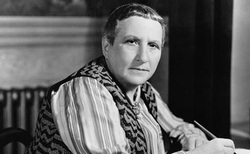 Gertrude Stein's rejection letter merits a special place among rejections, if only because the publisher put so much effort into it. This parody demonstrates the principal character flaw of publishers: they believe they are the final arbiters of literary taste. One hardly needs to point out that being a music critic does not make you Rachmaninov. Or even a Rach knock-off.
Gertrude Stein's rejection letter merits a special place among rejections, if only because the publisher put so much effort into it. This parody demonstrates the principal character flaw of publishers: they believe they are the final arbiters of literary taste. One hardly needs to point out that being a music critic does not make you Rachmaninov. Or even a Rach knock-off. Stein, whose salon eventually became the center of the Parisian art world, was the author of The Autobiography of Alice B. Toklas, a bestseller.
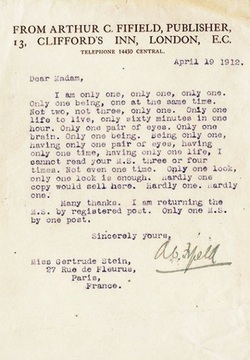 The letter reads:
The letter reads:Dear Madam,
I am only one, only one, only one. Only one being, one at the same time. Not two, not three, only one. Only one life to live, only sixty minutes in one hour. Only one pair of eyes. Only one brain. Only one being. Being only one, having only one pair of eyes, having only one time, having only one life, I cannot read your M.S. three or four times. Not even one time. Only one look, only one look is enough. Hardly one copy would sell here. Hardly one. Hardly one.
Many thanks. I am returning the M.S. by registered post. Only one M.S. by one post.
Sincerely Yours,
A.C. Fifield
Letter image from http://www.flavorwire.com/232203/famous-authors-harshest-rejection-letters
Published on October 14, 2012 11:01
October 12, 2012
Rejections: Famous Authors, Part 2
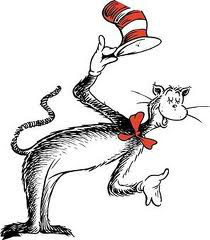 The wacky world of publishing continues with this second installment of Publishers Say the Darndest Things. There is a lesson to be learned from these rejections.
The wacky world of publishing continues with this second installment of Publishers Say the Darndest Things. There is a lesson to be learned from these rejections. Dr. Seuss
(Theodor Seuss Geisel's first book was rejected by 27 publishers - this is why)
'too different from other juveniles on the market to warrant its selling.'
The Left Hand of Darkness by Ursula K. LeGuin
(LeGuin's book went on to win both a Nebula and a Hugo award and to reshape a genre)
'The book is so endlessly complicated by details of reference and information, the interim legends become so much of a nuisance despite their relevance, that the very action of the story seems to be to become hopelessly bogged down and the book, eventually, unreadable.'
The Female Man by Joanna Russ
(winner of the Nebula award)
"We've already published our feminist novel this year, so we don't want another" … "I'm sick and tired of these kinds of women's novels that are just one long whiny complaint."
Mary Higgins Clark
(rejected 40 times)
'Your story is light, slight, and trite.'
Colette
(Colette went on to publish 50 books)
"You won't be able to sell 10 copies."
Bridge Over River Kwai by Pierre Boulle
'A very bad book.'
The Clan of Cave Bear by Jean Auel
"We are very impressed with the depth and scope of your research and the quality of your prose. Nevertheless ... we don't think we could distribute enough copies to satisfy you or ourselves."
Jonathan Livingston Seagull by Richard Bach
(sold more than 7.25 million copies)
"Jonathan Livingston Seagull will never make it as a paperback."
The War of the Worlds by H.G. Wells
'An endless nightmare. I do not believe it would "take"...I think the verdict would be 'Oh don't read that horrid book'.'
Valley of the Dolls by Jacqueline Susann
' ...she is a painfully dull, inept, clumsy, undisciplined, rambling and thoroughly amateurish writer whose every sentence, paragraph and scene cries for the hand of a pro. She wastes endless pages on utter trivia, writes wide-eyed romantic scenes ...hauls out every terrible show biz cliché in all the books, lets every good scene fall apart in endless talk and allows her book to ramble aimlessly ...'
The Fountainhead by Ayn Rand
'I wish there were an audience for a book of this kind. But there isn't. It won't sell.'
Emily Dickinson
'(Your poems) are quite as remarkable for defects as for beauties and are generally devoid of true poetical qualities.'
Edgar Allen Poe
'Readers in this country have a decided and strong preference for works in which a single and connected story occupies the entire volume.'
Moby Dick by Herman Melville
'We regret to say that our united opinion is entirely against the book as we do not think it would be at all suitable for the Juvenile Market in (England). It is very long, rather old-fashioned...'
Jack London
'(Your book is) forbidding and depressing.'
The Torrents of Spring by Ernest Hemingway
'It would be extremely rotten taste, to say nothing of being horribly cruel, should we want to publish it.'
Rudyard Kipling
'I'm sorry, Mr. Kipling, but you just don't know how to use the English language.'
Sanctuary by William Faulkner
'Good God, I can't publish this!'
Published on October 12, 2012 09:36
October 11, 2012
MARKETING: SHAMELESS SELF-PROMOTION
 Marketing is the bane of an author's existence. It distracts us from what we really want to be doing: writing. It forces us to enter into the uncivilized world of advertising, where strident ads claw their way into the consumer's consciousness, convincing the public to buy what they don't want, can't use, but must have. It's a jungle out there and, frankly, we don't like getting our hands dirty. Writers are shy, reclusive creatures, who would much rather sit at home, sipping Darjeeling in our pajamas, quietly composing the Great American Novel.
Marketing is the bane of an author's existence. It distracts us from what we really want to be doing: writing. It forces us to enter into the uncivilized world of advertising, where strident ads claw their way into the consumer's consciousness, convincing the public to buy what they don't want, can't use, but must have. It's a jungle out there and, frankly, we don't like getting our hands dirty. Writers are shy, reclusive creatures, who would much rather sit at home, sipping Darjeeling in our pajamas, quietly composing the Great American Novel.This is a fantasy. Whether you are an unpublished neophyte or an author who has hit the big league, marketing is the name of the game. And like any other game, there are rules.
Rule #1: You are not selling a product – you are selling yourself.
Regardless of the concerted efforts of the publishing industry to turn books into products, they are not. Books are ideas. They represent what is in the author's mind – nothing more. Even if a book turns into a fad, which is what every publisher hopes, it is still an idea. Your idea. Which means that what you write is inextricably bound to who you are, or, who everyone else will believe you are. (I know what you're thinking right now. You have no choice in this matter, so don't even go there.)
This is how you begin:
First: Define yourself. Who you are is not determined by who you actually are, but by what you write. For example, if you write children's books you are cheerful, accessible, and any mother would be happy to leave her only child with you for a week. Your photograph will show that person – a friendly smile (with teeth), wearing parental clothing, in pleasant colors. If you write horror-thrillers, you can go with a brooding photo, either in black and white or in very subdued hues, no smile – or if you must, a Mona Lisa impersonation. Avoid portrait studios. Your picture is worth a thousand careers, so make sure it doesn't look like the one in your high school yearbook.
Second: Project yourself. Your website (and you must have one) should reflect your image. Of course, your writing will be showcased, but the site's mood will be determined by your writer persona. Same for the blog (and you must have one). Your picture will be on the first page of your website along with a brief above-the-fold bio. A different, smaller portrait of you must be at the top of every other page on your website. Anyone who views your website must feel as if she or he is getting to know you. Your blog should have a theme in keeping with what you write. (That means you cannot blog about your cat unless you write books about cats.) You can blog about writing, of course, but a lot of people do that, so unless you are famous, competition will be fierce. And remember: You are a writer - even when you are blogging. So give it your best.
Third: Establish yourself. After you have set up your website and blog (and you don't need to publish anything first), join online groups appropriate to your writing themes, get on forums, and make comments on other blogs. Use the name you write with – for example, if your author name is your full first and last name, that will be your “handle.” Be proud! Let people see your name, and your face. And don't write anything that you would not want to be read, out loud, in court, by a judge.
Fourth: Share yourself. After you have spread your name around, it is time to spread your website and blog. Join Linkedin, and post your website and blog on the appropriate discussions. If there isn't a discussion about sharing blogs or websites, then start one. Even as I type this entry, there are several ongoing discussions on Linkedin that encourage writers to share and “like” one another's websites. Join every group you can think of, alumni associations, Writer's Digest, Librarything, Goodreads, and post a profile with as much detail as you can muster. Needless to say, Facebook, Twitter and any other form of social media that has been invented in the last five minutes are valuable tools for building a following.
Now you can go ahead and publish. (More on how to accomplish that task to come.)
Good website: http://misaramirez.com/for-writers/marketing-and-promotion-part-one/
One author's feedback after five months of self-promotion: http://www.theloneliestplanet.com/2012/08/book-marketing-my-five-month-progress.html
Published on October 11, 2012 12:32
October 8, 2012
Rejections: Famous Authors, Part 1
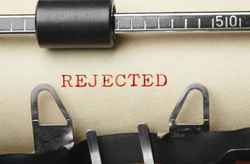 Rejections are hard on budding young authors - even on old famous ones. (We are an insecure lot.) The following list of authors who have been treated almost as badly as you have is bound to make you feel better. If nothing else, know that you are in good company. From the American literary publisher Knopf's Archives at the Harry Ransom Humanities Research Center at the University of Texas at Austin:
Rejections are hard on budding young authors - even on old famous ones. (We are an insecure lot.) The following list of authors who have been treated almost as badly as you have is bound to make you feel better. If nothing else, know that you are in good company. From the American literary publisher Knopf's Archives at the Harry Ransom Humanities Research Center at the University of Texas at Austin:Jorge Luis Borges
'utterly untranslatable'
Isaac Bashevis Singer
'It's Poland and the rich Jews again.'
Anais Nin
'There is no commercial advantage in acquiring her, and, in my opinion, no artistic.'
Jack Kerouac
'His frenetic and scrambled prose perfectly express the feverish travels of the Beat Generation. But is that enough? I don't think so.'
Lady Chatterley's Lover by D H Lawrence
'for your own sake do not publish this book.'
The Wind in the Willows by Kenneth Grahame
'an irresponsible holiday story'
Lord of the Flies by William Golding
'an absurd and uninteresting fantasy which was rubbish and dull.'
Watership Down by Richard Adams
'older children wouldn't like it because its language was too difficult.'
On Sylvia Plath
'There certainly isn't enough genuine talent for us to take notice.'
Crash by J. G Ballard
‘The author of this book is beyond psychiatric help.'
The Deer Park by Norman Mailer
'This will set publishing back 25 years.'
Gentlemen Prefer Blondes by Anita Loos
'Do you realize, young woman, that you're the first American writer ever to poke fun at sex.'
The Diary of Anne Frank
‘The girl doesn’t, it seems to me, have a special perception or feeling which would lift that book above the “curiosity” level.’
Lust for Life by Irving Stone
(which was rejected 16 times, but found a publisher and went on to sell about 25 million copies)
‘ A long, dull novel about an artist.’
Barchester Towers by Anthony Trollope
'The grand defect of the work, I think, as a work of art is the low-mindedness and vulgarity of the chief actors. There is hardly a "lady" or "gentleman" amongst them.'
Carrie by Stephen King
'We are not interested in science fiction which deals with negative utopias. They do not sell.'
Catch – 22 by Joseph Heller
‘I haven’t really the foggiest idea about what the man is trying to say… Apparently the author intends it to be funny – possibly even satire – but it is really not funny on any intellectual level … From your long publishing experience you will know that it is less disastrous to turn down a work of genius than to turn down talented mediocrities.’
The Spy who Came in from the Cold by John le Carré
‘You’re welcome to le Carré – he hasn’t got any future.’
Animal Farm by George Orwell
‘It is impossible to sell animal stories in the USA’
Lady Windermere’s Fan by Oscar Wilde
‘My dear sir,
I have read your manuscript. Oh, my dear sir.’
Lolita by Vladimir Nabokov
‘... overwhelmingly nauseating, even to an enlightened Freudian … the whole thing is an unsure cross between hideous reality and improbable fantasy. It often becomes a wild neurotic daydream … I recommend that it be buried under a stone for a thousand years.’
Published on October 08, 2012 07:24
October 4, 2012
Writer's Block
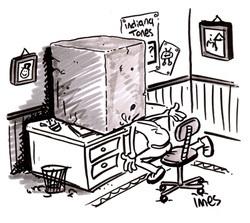 I don't believe in writer's block. I believe in illness. I believe in grief. I even believe in leprechauns occasionally. But I don't believe in writer's block.
I don't believe in writer's block. I believe in illness. I believe in grief. I even believe in leprechauns occasionally. But I don't believe in writer's block.My father, who wrote a great deal ( in longhand, on yellow legal pads) used to shave whenever he got stuck. The water was soothing and somehow, while drawing the razor across his face, his thoughts would come together. He gave me this small personal revelation after I had described how showers "unstuck" me when I'd come to a roadblock. The roadblocks were invariably the result of having written something wrong - a scene that took the story on a detour, or a stretch of dialogue that was filled with potholes. Eventually, the shower would clear my head, reveal where I had gone astray, and I would leap back into the driver's seat, almost dry.
Those small roadblocks are not writer's block. They are just temporary obstacles.
Writer's block is when the words go away. Entirely. There is nothing in your head. When you lie down in the evening and think of your characters, there is nobody there. The film has ended, the credits have rolled, and there is just a blank screen where the action once was.
I have not written anything of substance, that is, anything of fiction, since the day my father died. When he left the planet, he took his shaving kit with him. It's not really so much that I miss him, although I do, but that writing was the only thing we had in common. Like most fathers of his generation, he found it difficult to talk to his children - and impossible to say anything personal.
My father left behind a collection of nearly eight thousand books, several scientific volumes that he had edited, over a hundred published articles, and dozens of papers he had written but had not gotten around to publishing. The week before he died, I'd said I'd get them published. It was the last thing I said to him.
I don't believe in God. I don't believe in Spirit, or The Universe either. But I do believe in promises. I have the feeling that when I keep mine, the empty space that used to be inhabited by people who don't exist will once again be filled. And my father, who never got the chance to hold anything I'd published in his hands, will let the words come back.
Published on October 04, 2012 07:54



